#also this is more so referring to the more positive interpretations of their relationship I've seen fyi
Explore tagged Tumblr posts
Text
Never Love An Anchor by Crane Wives is their song and I refuse to let my vision become unknown
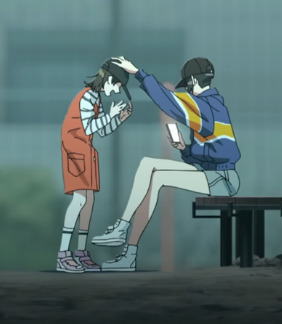
#I was going to put like specific lyrics here#But literally every lyric in the song I can connect to them to some level#Christ#{ ⚖️ after knowing all I wonder. can you really forgive them? 👁️}#milgram#milgram project#kotoko yuzuriha#yuzuriha kotoko#milgram kotoko#milgram lucky#milgram keiko#(i can't decide between the two names sorry)#also this is more so referring to the more positive interpretations of their relationship I've seen fyi
47 notes
·
View notes
Text
i've written before about how fire lady katara isn't an inherently disempowering or racist trope, as have many others, but lately i've been thinking about how arguments against fire lady katara often tend to utilise a surface-level interpretation of colonial trauma.
[edit: this post will use the term "colonial trauma" because those who argue against fire lady katara usually use the same wording or are referring to that concept. but it's important to note that according to show canon, the fire nation did not colonize the southern water tribe and zuko and katara did not have a colonizer/colonized relationship.]
antis who present this argument usually posit that marrying zuko would be a form of re-traumatization for katara, while marrying aang would "protect" her. katara is supposedly more shielded from confronting the impact of colonization in the southern water tribe or on air temple island than she would be with zuko in the fire nation, which contextualizes colonial trauma purely through the lens of physical interaction with the colonial power (ie. living in the fire nation or looking after the people of the fire nation). whether intended or not, this argument inadvertently limits colonial trauma to the geographical boundaries of the colonizing country and implies that it can be reduced or averted solely by minimizing contact with said country.
even leaving aside that we have seen katara in the fire nation (and enjoying herself there), the implication here is that active engagement with a colonial power as a member of colonized peoples is an inherent form of re-traumatization... which i take issue with for multiple reasons.
firstly, katara lives in a world that has been permanently shaped and changed by imperialism, and that's going to affect her no matter where she goes. sequestering herself in the south pole her whole life and never seeing a glimpse of fire nation red again won't allow katara to escape the legacy of colonization or the trauma it has caused her, because its influence is rooted in everything from her family to her tribe to her own bending. believe me, i understand the appeal of a world where women of colour can avoid reckoning with the impact of colonization by simply never setting foot in the colonizing country again, and why people might be uncomfortable with zutara individually as a result - but i can't accept it as a valid argument against the ship, because that's just not how colonial trauma works.
secondly, the idea that this "protects" katara reeks of paternalism because katara is not a character who chooses her path simply based on how safe or comfortable it is. if that was the case, she would never have left the southern water tribe at all! she could've remained there her whole life and likely been safe, since the fire nation had no real interest in the south pole any longer. katara is fundamentally defined by how relentlessly revolutionary she is - over and over, she chooses to do what is right, what is hard, what is unexpected, even at cost to herself. she challenges injustice and discrimination and bigotry; she fights for the downtrodden and speaks for those who can't speak for themselves; she will never ever turn her back on the people who need her. does that truly sound like someone who needs to be hid away and protected from her own supposed re-traumatization?
thirdly - and i fully accept that there are those who might disagree with this - katara actively choosing to engage with her colonial trauma can be empowering just as it can be traumatizing. don't get me wrong: as a woc and a minority in my own country, i understand how tiring it is to do this. i understand the exhaustion of confronting what was done to you and your people, of facing down bigotry over and over. i understand the desire to run away from it all, and why it can be wish fulfilment for others to let katara do so. i really, really do.
but there is also wish fulfilment in letting katara fight, as a brown girl with power and resources that few brown girls in the real world hold. there is a power fantasy in seeing katara head into the belly of the beast and emerging triumphant. there is empowerment to be found in seeing katara struggle with racism and ignorance and mindless hate to enact change - and succeed. i love reading and writing about katara unpacking her trauma regarding the fire nation, about growing to love the place she once hated, about reconciling both her homes and healing from the wounds of her childhood.
and ultimately, i think that's what katara would want for herself. after throwing herself head first into the fight against the fire nation, after facing down her greatest trauma instead of letting it consume her, after helping and protecting the people of the fire nation, after refusing to let the fire nation take anything else from her - i firmly believe that the last thing katara would do is allow herself to be ruled by the fire nation instead of being the one ruling it.
personally, i find that a more hopeful and victorious narrative than one where she remains safe and sheltered away from the fire nation, but forever haunted and dictated by her trauma. would that be realistic? perhaps. but the entire point of foiling katara with characters like jet and hama is to show that she's not doomed to be mired in the pain of her past. that where their stories could only end in tragedy, hers can - and does - end in hope for something better, as she always believed it could.
376 notes
·
View notes
Text
So, I have recently noticed that out of all of Sleep Token's discography, there are exactly only 3 songs where Vessel isn't addressing someone directly as a dialogue (doesn't use the words you/we), and 2 of those he still mentions someone in the 3rd person.
Atlantic - doesn't use you/we. The second person (you) is implied, but the song is mostly about Vessel/his inner monologue and memories. If I'm not mistaken this is the ONLY song that mentions him crying sobbing (I've barely begun and I'm already sad).
call me // flood me // weather me // etc
Alkaline - doesn't use you/we but spends the whole song describing someone and how she affects him.
she is changing me // her molecules // she's not acid nor alkaline // i'm caught up with her design // etc
Distraction - doesn't use you/we, and the main focus is on him. Vessel mentions someone in passing (in the 3rd person), but mainly it's all about him.
she is not like any other (...)
Worth mentioning that the ONLY song that breaks the you/we // dialogue rule, that seems to be solely about Vessel and doesn't reference any other person is DYWTYLM, if you go with the most common interpretation that this is Vessel talking to himself/his reflection.
[of course it's up to personal interpretation but to me this is what makes the most sense]
Why is this interesting? BECAUSE, in literally every other song, his feelings about the person, their relationship, and even his own position tend to change a lot.
Sometimes Vessel gets extremely passive agressive and angry at them (I see you Granite). Others he is just pouring out his love and desire, and being the most romantic individual ever. Sometimes they are someone to defend or be guarded by, others they are a menace and dangerous; someone to walk away from. All of these are things he says directly to them, even if he does flourishes and dances around the question.
And yet, in all 3 of those songs, they are always painted as someone who is "good" and "unlike any other", who protects them, who is "more than he could ask for". Someone whom he loves and is content with. In Alkaline, where he mostly just talks about her, Vessel describes her as "either born in hell or heaven sent" and goes on about the dichotomy of her being, but is ultimately "into it". At no point he shows remorse or discontent regarding her.
On the other hand, he is always suffering in them (technically he is always suffering anyways but-). In none of these songs does Vessel ever takes the role of someone who could retaliate. Of someone who is strong. If we look at Atlantic and Distraction (and DYWTYLM if you want to), the only songs pretty much solely about him, he is always in pain, on the verge of collapsing completely. Even Alkaline, he is glad to be consumed and entangled by her.
In those songs, Vessel is crumbling and sobbing and falling apart, and begging to be "put to sleep"; he is willing to be drowned because "it's too late for him", offering no resistance; he is wishing to be someone else, wishing to love himself and "smile back at him", as he knows he should.
When talking directly to them, Vessel is as loving and sweet as he is angry and hurt by them. And yet on the very, very few occasions he talks to only to himself, he is always seeking refuge and declaring his love for them, while running from himself and begging for death.
Also interesting to point out that, with the exception of DYWTYLM, all of them belong to This Place Will Become Your Tomb. The depression album. The "let me be taken by the cold waves and sink to the bottom of the ocean so I don't feel anymore pain" album.
#tpwbyt my most beloved#i made myself sad so now you have to be sad too#these are are many words just to say how much i love Atlantic lmao#AND DISTRACTION. my sad girlie#sleep token#sleep token lore#tpwbyt#darya is unhinged
315 notes
·
View notes
Note
Hey! Have you noticed the visual parallels between the gun fiend and Chainsaw man in this latest (152th) chapter?
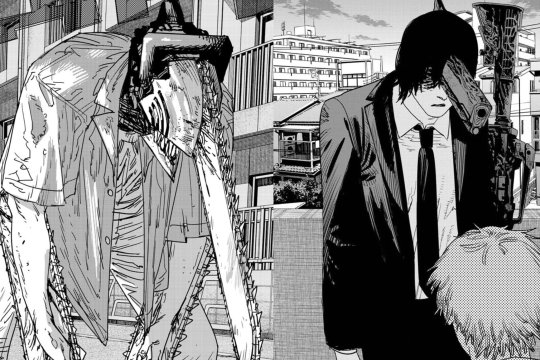
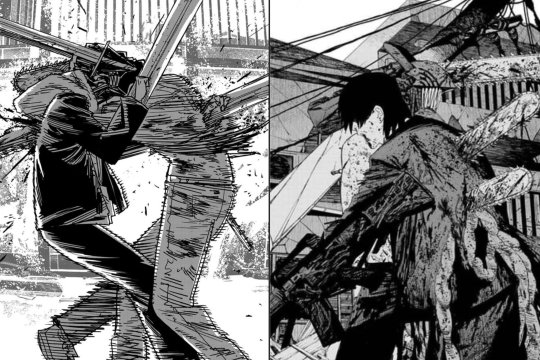
The parallel between Aki and Denji in the last chapter
No, I hadn't noticed, and I like that others have because I might have an explanation for this parallel.
Fujimoto likes parallels, but this time he does it the other way round. Let me explain: for me, and according to my interpretation, he had already made an explicit reference to chapters 78/79 in this chapter:
Chapter 142 exploited Denji's relationship with others, but also with being a CSM, just as Fumiko's speech only reinforces the fact that even when she places herself as a victim, she reinforces Denji's position as a martyr.
Even when Fumiko argues that she saw CSM as a child, the chapter proves her wrong, whether through her unsuccessful manipulation techniques, her many contradictions, but above all her behaviour is typical, allowing Denji to deny the pain he suffered by killing his brother.

I won't go into it again ((if you want to know more, the link is above)) the only thing you need to remember here is that Fujimoto still intends to exploit Aki's death, albeit in a subtle, poetic way in part 2.
In chapter 152, Denji suffers because he has decided to; his suffering is his own, he demands it and even sees it as a means of experiencing pleasure. What's more, this chapter follows on from chapters 150/151 in Denji's claim to his own identity: I WANT to be CSM, and no one is going to stop me. The negative consequences are mine because I've decided to.

Whereas during his confrontation with Aki, Denji's identity was stolen by his "fans" (a theme dealt with in chapter 142), who positioned themselves as the only suffering parties (ignoring Denji's), and it was the frightened, bruised men and women who decided that CSM had to save them, had to act and kill.
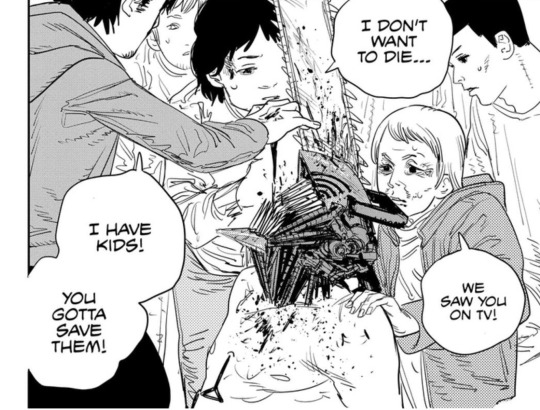
So chapter 152 is more than an awakening, it's Denji who takes back the right to suffer if he has decided to do so. Before, it was always the others who decided, but instead of taking the plunge and saying: I'll never let myself suffer again, this time the martyr doesn't want his suffering to be taken away from him.
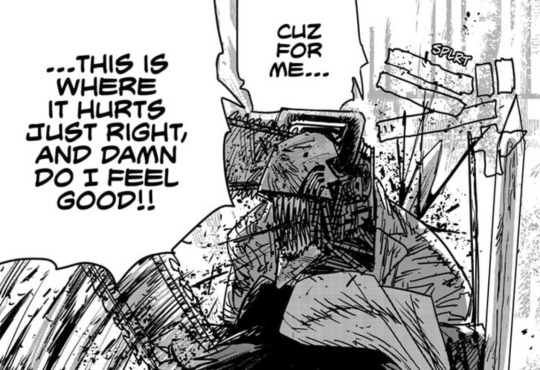
Because if we take away Denji's suffering, he won't turn into a CSM anymore
If that's taken away, his memories of Power and Aki are fragmented
These last two sentences are actually linked, because Denji has learnt to love just as much as he has learnt to suffer through Aki and Power. Aki's curse is to have been possessed by his sworn enemy, the Gun Devil, who reclaims his rights over the man who tried to resist him: to be there to make Aki's family suffer, always, even the second time around.
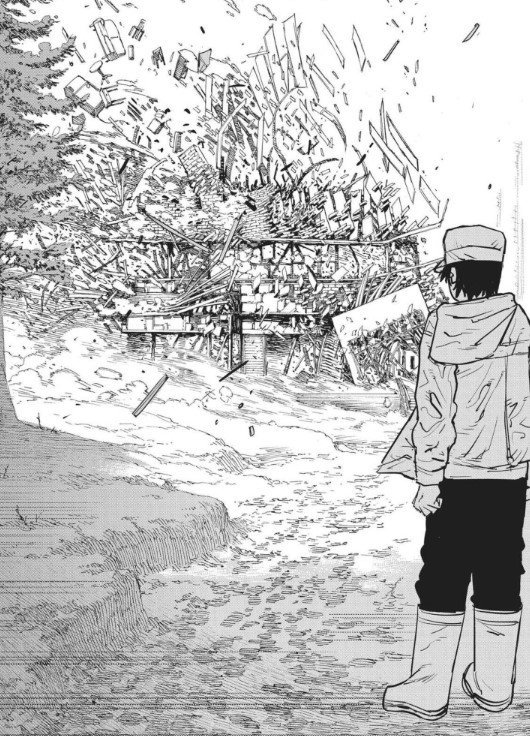
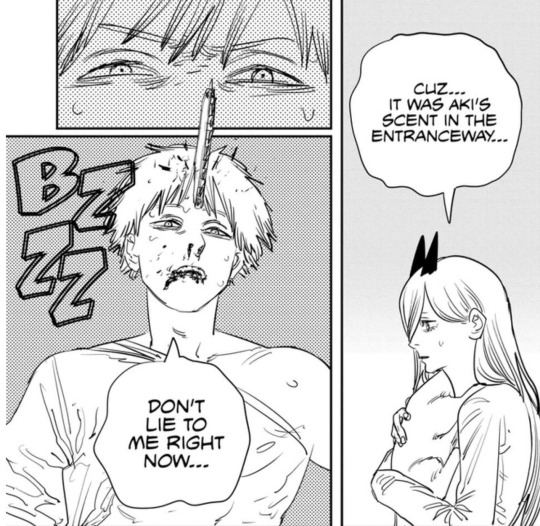
As the curse repeats itself, Aki's mind is stuck in his childhood, when it hadn't yet been broken, so he's blindly enjoying himself. Because, paradoxical though it may sound, it was when Aki realised the cruelty of this world, the loss of loved ones, that he tried to protect his family - the greatest act of love. Suffering is an awareness.
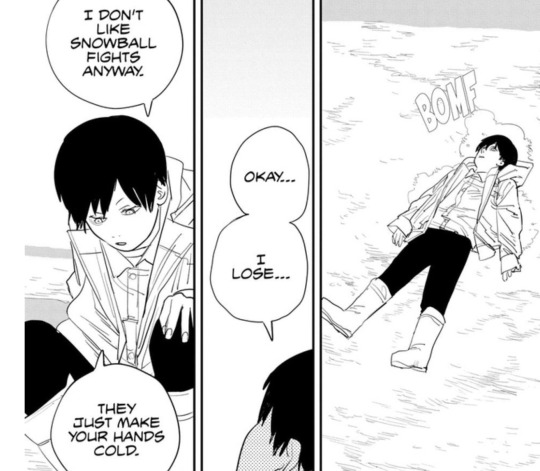
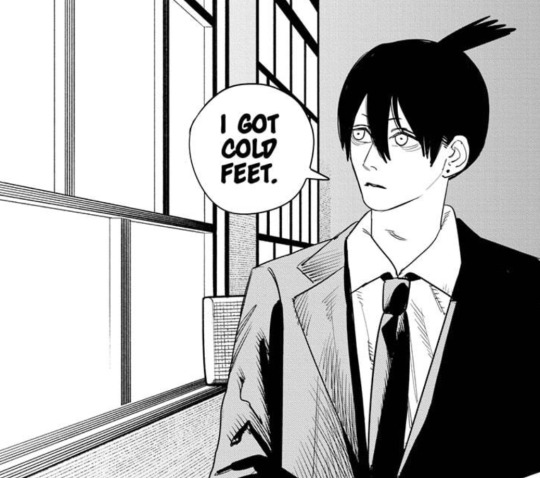
Aki had gambled on his suffering before, wasting his years of life with almost no ties. And when he began to change his perception of wanting to do something for his family, those wasted years didn't leave him enough time to protect his second family.
While he was escaping the suffering of his first family, he didn't even realise that he was causing the second to suffer. Fate was simply amused.
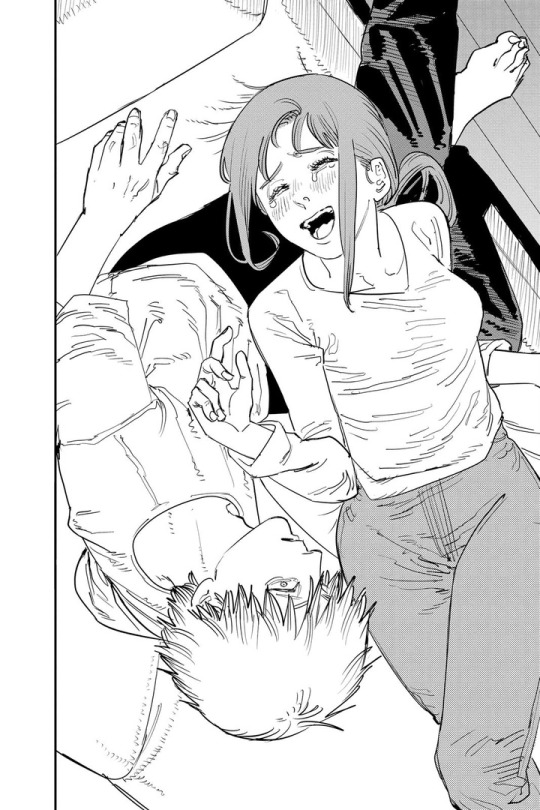
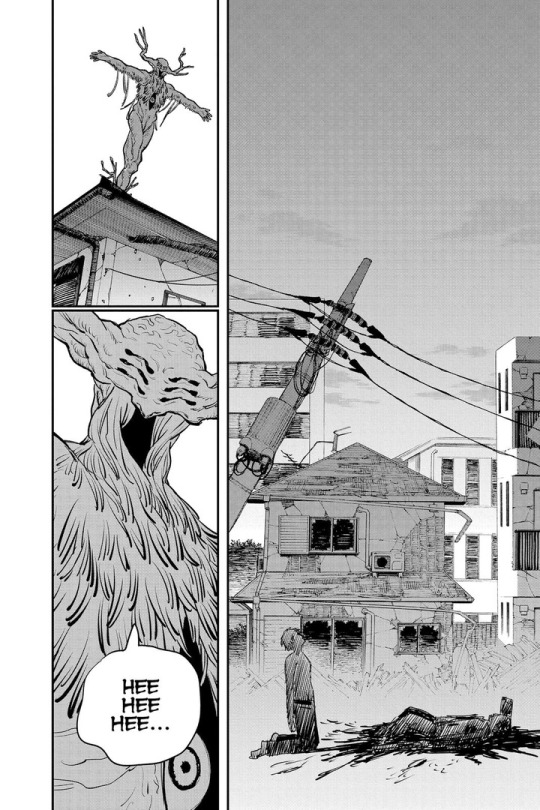
It is just as much for Power, a bestial being by nature who has already learnt about the suffering of losing loved ones with Meowy's kidnapping, Aki's anguish possessed at the door, bringing a birthday cake to Denji as an act of kindness, before realising that she would rather die than let Denji die. Suffering is also what brings destinies together and intertwines them.

Power and Aki are symbols of the same thing: when suffering began to be reflected in others, materialising in the fear of losing a loved one, fate turned against them.
So what Denji is doing is a narrative attempt to free himself from his fate, if he starts to fear more for Nayuta than for himself, if he stops being CSM for her, then the passage of suffering turned against oneself, there will always be someone to catch the ball. So Denji ends the cycle.

Denji will see no-one but his pain, Pochita, he will ignore even the flames that tore him away from his animal family, he will push back to Nayuta. It's a retreat into his own identity in the final chapter, a futile attempt to escape from a pain even worse than the pain of being cut in two, the pain of seeing another part of himself ripped away: a loved one.

Now we've pretty much understood the parallel. But don't forget the beginning of this post, Denji is doing exactly what Aki is doing.
Chapter 152 is the hero's attempt to regain control of his destiny, as if suddenly aware of the suffering inherent in the work, wanting to reverse it, to turn it into pleasure.
But he will not escape his fate. Denji may laugh, but only fate will have the last laugh.

#csm spoilers#chainsaw man#csm#csm part 2#csm 152#csm 151#csm 150#csm 142#denji hayakawa#denji#nayuta#nayuta hayakawa#aki hayakawa#power hayakawa#aki#my thoughts#ask
226 notes
·
View notes
Text
I'm gonna share some Guilty Gear LGBTQ+ "headcanons" that are most likely canon. Most of these go off of the idea that Elphelt's Magnum Wedding Instakill (MW) doesn't override sexuality.
Despite my claims of these being most likely canon, most things here are not directly confirmed by Daisuke Ishiwatari, ArcSystem Works, or any other individuals involved with the making of these characters or the Guilty Gear franchise and the following should still be taken as headcanon as these are my readings of certain things I've found in the games. You have been advised.
May - Bisexual, possibly confused lesbian - She does, in fact, fall in love with Elphelt here, but has a thing for Johnny, possibly. The thing with Johnny is that she might not actually have a crush on him. From my own experiences, it's possible that May could be overly obsessed with Johnny, and may be misunderstanding her obsession and hyper fixation on him as a romantic interest in him. This idea also makes the whole Johnny and May thing less creepy as Johnny is her dad, and, I believe is supported by one of MW lines being "C-Could this be romance?! Oh my gosh!" implying that how she feels for Elphelt during Magnum Wedding is different from how she feels for Johnny, possibly even completely redefining romance for her, which is pretty huge for someone who's been seemingly romantically attracted to someone for years.
Millia - Bisexual, possible preference for women - She 100% had romantic and sexual feelings for Zato, which he manipulated prior to his death. Because of the sexual manipulation from Zato, it seems that she is not keen on being involved with a man again in any way. However, in MW, she falls in love with Elphelt, even going as far as to say "Have I chosen the yuri route..?" This doesn't really explain the "preference to women" part of this idea, but another quote of Millia's is "This is a whole new world...!" which, at least to me, shows that she experiences romance with a woman in a much more positive way than with a man.
Elphelt - Pansexual - When MW is used against herself, Elphelt says "I-I'll just take anyone...?" So like, yeah. Also she fell in love with herself, that's pretty gay.
Baiken - Bisexual - I'm pretty sure that she and Anji are confirmed to be a thing? I could 100% be wrong on that. However, when Baiken gets hit with MW, she falls in love with Elphelt. Despite that, she seems very reluctant, which could be shown as rejection (which I'll get to because it DOES happen), but I interpret this instead as denial of her feelings. This is further emphasized by her character, being a cold, lone wolf type of person. This can be seen in her platonic relationships as well, in which, only really accepting the company of Anji (possibly not platonic) and Delilah with Delilah being her latest friendship. The idea of her being in denial is in the line, "Won't work. Try to fall for someone el...?!" which, in my interpretation, means that she doesn't believe she's good enough, but is cut off by the sheer amount of love she's feeling from MW.
Jam - Bisexual - She wants to hire "cute boys" (boys she's attracted to) like Ky Kiske to work at her diner. In both Jam's Story ending 1 and Bridget's story ending 1 of Accent Core Plus, Jam actually hires Bridget to work at the diner. While Bridget identified as male then, she now identifies as female, though, that might not mean much. What means much more is her MW line, "Cute girl maybe ok, too." which implies that "cute girls" (GIRLS she's attracted to) would be hired as well.
Jack-O' - Bisexual - Is Aria, wife of Sol Badguy. They're also together in the ending of Strive. Reason that she's bisexual is because she refers to her and Elphelt as a couple in her MW line "Birth of a new-age couple?!" so that's pretty cut and dry.
Kum - Lesbian - When hit with MW, she falls in love with Elphelt as shown by the line, "Romance filter severely damaged!" meaning that, well, romance. Duh. I say lesbian specifically because, to my knowledge, she doesn't show attraction to any men, really just Elphelt, if anything were to come out where she shows attraction to a man or if I missed something that does the same, then I'd say she's bisexual. But for now, she's lesbian.
Venom - Gay - Now for the part that proves that MW doesn't override sexuality and that all of the above characters are attracted to women. Venom is canonically gay, this isn't a headcanon, this is just outright confirmed. However, it's important to note that Venom resists the romantic nature of MW as shown by his lines, "My loyalty cannot be broken!" "You cannot tempt me!" and last, but not least, "Lord ZATOOOO!" The fact that Venom, who in canon is exclusively attracted to men, does not fall in love with Elphelt in MW, means that the above characters DO fall in love with Elphelt and ARE attracted to women.
Bedman - Aroace - Completely rejects the concept of being in love ("Damn witch! You cannot take my heart from me!" "Are you trying to corrupt me?) when hit with MW, and, in one line, exclaims, "You cannot replace Delilah!" which is just comparing the effects of MW to his only other relationship, which is platonic, which is with his sister, which makes me feel like it's not at all romantic or sexual to him in any way.
Ramlethal - Aroace - At first, I thought she could be lesbian, but one of my friends who knows a lot more about GG lore and Ramlethal in specific than me argued that she's Aroace, citing one of her taunts in Strive that implies she has no concept of romance and that it's kinda gross to her. He also said that her saying "Is this my true self?" is about her experiencing human emotions, which she doesn't believe she can do (at least during Xrd's story mode). He, however, did say that as her concept and expression of human emotions develops, things could change, and she may end up developing romantic feelings, but that is not definite. As of right now, Ramlethal is aroace, at least in my books.
Testament - Nonbinary with attraction to men - I don't know if Testament has any attraction to women, but I read their intro lines in Strive with Johnny as them being a thing, as Johnny offers to go out to eat after their fight in one line. Testament is confirmed to be nonbinary though.
Johnny - Bi or Pansexual, though could still be straight? - This one veers much more into headcanon territory, but it's possible that Johnny could be bisexual or pansexual as he may in a situationship with Testament, as I mentioned just above. Testament does, however, present more femme than masc, and does use feminine pronouns alongside gender neutral and masculine pronouns, so it's possible that Johnny simply counts Testament as a woman and is still straight.
Bridget - Sapphic transgender woman - Bridget is a trans woman in canon, however, it's not confirmed if she is attracted to men, women, neither, or both. However, Daisuke once made some very interesting art where May is gripping Bridget's butt pretty strong (which is really just more evidence for May being sapphic), but Bridget doesn't seem troubled by it or anything soooo. Also, of the 2 characters that have special lines when defeated by Bridget in Strive, May gets 2 lines while Bridget herself only gets 1, no one else has a special line at this time.
I-no - Pansexual - Pretty sure she'll top anyone, even people who claim to be tops. This is basically just a headcanon, but apparently she teases both men and women when defeating them, soooo.
BONUS!!
These characters are, in my opinion, heterosexual despite this being contested in some smaller aspects of the community.
Sin - When hit with MW, one of Sin's lines is, "Farewell... virginity..." so yeah, he's straight. Idk, could be bi, but I see no evidence for that. Most people say he's aroace because he's so young, childish, and dumb, but Dizzy fell for Ky around the same age soooo...
Dizzy - When hit with MW, it feels like she's rejecting Elphelt, much like Venom and Bedman, saying "I'm married!" "I'm sorry, I can't!" "I-I have a son..." much less like a denial of feelings similar to that of Baiken. I don't think her sexuality is contested as much as Sin's is, but I still feel like this is worth mentioning.
yeah i think that's it really
END
If you have any other pieces of evidence for OR AGAINST my ideas and evidence, then please share!!! I am open to CONSTRUCTIVE criticism :3!!!
Reminder that MOST of these aren't technically confirmed to be canon, so take these as head canons if anything, not cold, hard facts!! And please, do not be rude about these either.
Also, do not deny ACTUAL canon (Venom being gay, Bridget being a transwoman, and Testament being nonbinary) as that is not cool and disrespectful to the ideas of Daisuke himself!!!
Thank you for reading, and I hope you all have a great day ^^!!!!!
#lgbtq#lgbtqia#trans#transgender#lgbt pride#lgbt#bridget#baiken#i-no#testament#jack-o'#dizzy#bedman#elphelt#jam kuradoberi#millia rage#jack o' valentine#sin kiske#ramlethal valentine#guilty gear#venom guilty gear#ggxrd#ramlethal#kum haehyun#johnny guilty gear#may guilty gear#headcanon#ggst#guilty gear strive#guilty gear xrd
83 notes
·
View notes
Note
OH YOUR VERLAINE AND RIMBAUD POSTS AND THE TENDENCY OF ASAGIRI TO FLIP FLOP THE MENTOR/MENTEE OR ADMIRED AND HOW RIMBAUD WAS THE YOUNGER ONE BUT IN BSD VERLAINE WAS SOCIALIZED BY RIMBAUD
With Rimbaud and Verlaine, it's worth remembering that bsd!Rimbaud is Verlaine. His skill is Illuminations, but he gave Black #12 his birth name, Paul Verlaine. bsd!Verlaine was not originally named Rimbaud, but his youth, passions, and duality are Rimbaudian, while bsd!Rimbaud's more coddling temperament, at times paternal and at times impassioned, and last sentiments for bsd!Verlaine, are seemingly references to irlVerlaine's poetry about irl!Rimbaud. (Such as Watercolors: Green, an English translation of which I shared in a separate post.)
Notably, Verlaine published Illuminations on Rimbaud's behalf and influenced the content and arrangement that was published. His legacy is often related more to his relationship with and publication of Rimbaud than his own poetry, according to the journal articles I've been reading. bsd!Verlaine's Brutalization incantation also comes from Arthur Rimbaud's Les Sœurs De Charité.
But the bsd iterations of Rimbaud and Verlaine aren't wholly distinct either, each carrying fragments of the other, sometimes blurring together. That, too, is a homage to the philosophies of the irl!poets. For example, Rimbaud, at times, writes from Verlaine's perspective in Une Saison en Enfer.

Rimbaud's poetry is also marked for its dialogic perspective-shifting, and he wrote through and lived within a philosophy of ambiguity, duality, and self dissection (at least during his youth):
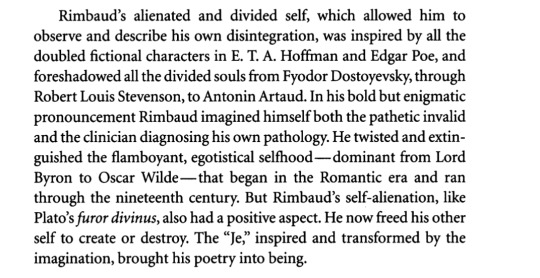
irl!Verlaine, too, had a dual personality at times:

So, I don't think Asagiri flip/flopped Rimbaud and Verlaine's roles; I think he's commentating on, illustrating, and interpreting where their poetry, legacies, and passions became thoroughly entangled, as filtered and processed through bsd's themes. I think Asagiri enjoys plucking tragedy from reality and asking, "What would it have taken for them to have found reason and purpose absent any?"
That said, I also don't think Asagiri is ever really inversing mentor/mentee roles, even in regard to Akutagawa and Dazai. irl!Akutagawa was not irl!Dazai's mentor, he was a profound influence who lived and wrote just prior to the era of modern Japanese literature in which Osamu Dazai made in his name. I think Asagiri is commenting on (i) where they were deeply alike in mind and heart, which is why Dazai found solace and reflections of himself in Akutagawa, and (ii) on the stylistic dexterity Dazai could have lent to Akutagawa had he been in the position to do so, specifically regarding the way Dazai intepreted the I-novel genre through perversions of the truth as a means for expressing sincerity and gut-wrenchingly raw autobiographical candor without flaying himself apart the way Akutagawa seemed to when bullied into confessional literature by the cultural zeitgeist.
(Akutagawa was criticized for his sharp brilliance since the era was consumed with confessional literature, in comparison to which Akutagawa's stylistic precision seemed to many distant and aloof. Parasocialism is older than Christ, and BookTok is a descendent, not the progenitor, of corrosively vapid takes.)
The choices in bsd are playful but sincere inquiries into + conversations with the works, legacies, emotional turmoils, and overwhelming humanity of the referenced authors. But, while I think there's immense profundity in call and response, especially across eras, literary cultures, and artistic mediums, I also think Asagiri is more consumed by revelations than reflections.
I'm also not so sure whether we can call Rimbaud socialized by any contemporary connotation of the word—


#bsd#bungou stray dogs#bsd rimbaud#bsd verlaine#rimlaine#irl rimbaud was absolutely feral#i know what youre trying to say re: socialized#but i dont think that meaning has any relevance here either#rimbaud was young but he was hardly malleable or impressionable#he was distinctly abrasive to and defiant of influences he didnt himself pluck to be absorbed#such as absinthe and french symbolism#i know there's an urge to contextualize him as a teenager because he very much was one#but there is a lot that we generalize about teenagers and children and any group really#that become useless at best and harmful at worst if we try to force their fit when considering individuals rather than broad approximations#same when trying to apply what we know of individuals to broadly approximate groups
53 notes
·
View notes
Text
About the Japanese relationship charts circulating around RE Twitter…
I've been seeing these images used to spark discussion... and arguments. Shipping wars aside, I was more intrigued by this Japanese term used to describe Leon and Ada’s relationship.
I want to explain these words in more detail, so this post will be about that + answering questions that some might ask. I'm also including Leon and Claire's chart as well.
Note: I am currently studying Japanese. I made this post partly because I like to understand advanced terms that are unique to a specific language. Despite this, my explanation is not immune to errors.

Leon and Claire’s relationship chart in Resident Evil: Infinite Darkness (2021).
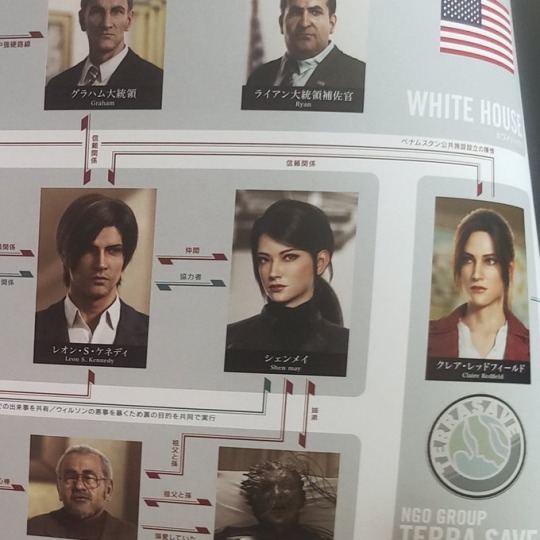
Explaining this first because this is fairly easy to understand.
信頼関係 (しんらいかんけい・shinraikankei) - A relationship of mutual trust.
Kanji breakdown:
信頼 > reliance, trust, faith, confidence // 関係 > relationship
It should come as no surprise to anyone that Leon and Claire trust and rely on each other.
Q. ‘Is the term exclusively used for them only?’
No. 信頼関係 was also used to describe Leon's relationship with President Graham (and Jason or Patrick).

Leon and Ada’s relationship chart in Resident Evil: 6 (2012).
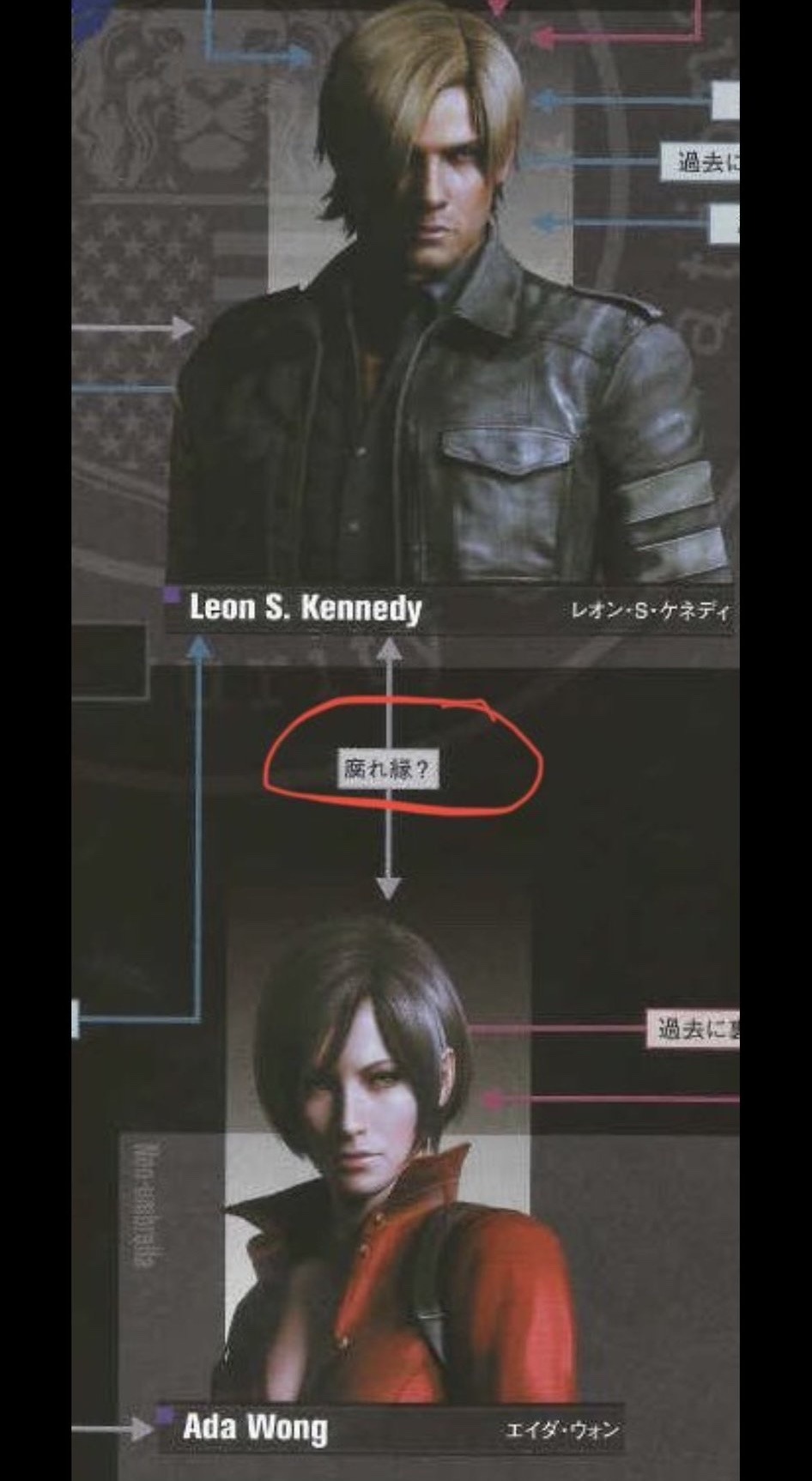
This is the term that others can't seem to grasp well (I mean they kinda do, but they also misinterpret it weirdly). In the English version, their relationship is described as ‘fatal ties’, but I don't care about that - I'm focusing on the Japanese version.
腐れ縁 (くされえん・kusareen) - an undesirable but inseparable relationship.
Kanji breakdown:
腐れ > to rot // 縁 > relations
The highlight of this word is the kanji 腐る, which is a negative verb used to describe something rotting/decaying.
The "inseparable relationship" part may be interpreted as romantic to some; as some shippers say, 'they are fated' (more on that later). But first, we need to understand what 腐れ縁 means in more context. Here are some excerpts I've taken from multiple sources.
離れようとしても離れられない関係 - A relationship that you know you should let go of, but can't. (This is consistent with OG RE4 Leon's line of 'she's a part of me I can't let go'.)
Note: 離れ (はなれ・hanare) mostly means 'to let go (of something/someone)' and 'to separate/to give up/to part ways'.
離れよう、縁を切ろうとしても断ち切れない好ましくない関係 - An unfavorable relationship that you can't cut off no matter how much you try to.
Note: 好ましい (このましい・konomashii) means desirable. 好ましくない (このましくない・konomashikunai) is the negative conjugation of it. 好ましくない関係 - undesirable relationship.
Just from this alone, you can see that their dynamic is difficult to understand. And that's what 腐れ縁 is.
Q. ‘Is the word 'rotten relationship' an accurate translation of the term?’

Google Translate translates this word LITERALLY. I think there is no true English equivalent of 腐れ縁, but yeah, 'fatal ties' is the term closest to it.
Q. ‘Can Leon and Ada be described as 'fated'?’
The answer is yes... and no. Here is another excerpt I find to be interesting:
「運命の相手」 を思わせるようなニュアンス ですが、 実際には好ましくない関係に使われることが 多い言葉です。- The term 腐れ縁 does have a nuance that is reminiscent of "destined/fated partner (or in other words, 'the one')", but in reality, it is often used to refer to undesirable relationships.
Q. ‘So... Is their relationship that bad?'
The answer to this question will depend on your own interpretation of Leon and Ada's dynamic - and that's why people are quite divided when it comes to them. It is said that 腐れ縁 can be positive... in the sense that if you experienced it before, you can now have a better judgment of people (lol). But in some cases, a long-lasting rotting relationship (like theirs) could mean that they at least have some level of mutual trust only they understand. It can work... but even the article I've read wasn't so clear on how it can work, so.

If you made it this far, I hope you found this interesting. :)
#kusare en truly is the perfect term to describe the relationship between these two in my opinion#leon kennedy#leon s kennedy#ada wong#claire redfield#resident evil#adorathoughts#analysis#日本語の勉強
38 notes
·
View notes
Note
So, it started!
Fandom: FNAF
Character: The mimic
Type of fic: concepts
I don't think there's much to add for this plot that wasn't said in that brainrot that was posted some time ago about him.
-🐻
Yeah, sure! I'll see what I can do for The Mimic. In this concept I refer to the character as just "The Mimic"/It as I'm not sure if there's a canonical gender pronoun (Wiki says The Mimic is Genderless and says "It")?
Also, FNAF related side note; I love how I've seen a 🦊🐻 and 🐇 anon but no chicken XD It would've fit so well. There may have been a 🐣 anon but they never interacted so idk....
Potential spoilers for FNAF: Ruin and Tales From The Pizzaplex?
Yandere! The Mimic Concept
Pairing: Romantic (It thinks so, at least)
Possible Trigger Warnings: Gender-Neutral Darling, Obsession, Violence, Murder, Blood, Stalking, Kidnapping, Forced affection, Forced "relationship".

The Mimic does exactly what you think it would.
It mimics what's around it... that's how it's survived this long.
It's creation was meant to be an AI that learns and mimics things it sees.
This is how The Mimic learned to copy its creator's son, it's also how it learned violence.
Mimicking what's around it caused so many gruesome murders by its hands.
The Mimic takes up violent behavior way before you even meet it.
It's locked away underground yet occasionally still finds new victims.
How it transitions into yandere territory is this according to the brainrot I was sent:
It copies other behavior.
Maybe The Mimic sees two Pizzaplex workers getting a bit too... friendly with each other.
Perhaps on the job they decided to use the private time to show some affection.
Holding hands... hugging... kissing... telling each other they love one another.
The typical stuff you'd see with couples.
Sadly... they quickly become victims of The Mimic.
But not before The Mimic learns something new.
The Mimic learns a new thing to copy... compassion.
Or at least... a twisted form of compassion.
The Mimic picks up on what couples do, yet the violence it learned before still lingers in its code.
Who knows, maybe the AI even finds jealousy to copy from the same couple or some other workers.
That or jealousy is something it learns on its own.
The Mimic is finding ways to process these new lessons and behaviors up until you find your way into the underground Pizza Place.
You could be another guard sent to clean things up or just an outsider who managed to find themselves stuck here while exploring.
Either way, as you roam the underground levels, you're being stalked.
The shambling Frankenstein of a bot follows you around yet its intentions are unclear.
It stays out of your view and it processes what it wants to do next.
It's mind goes to violence again... like all the rest.
Then it thinks of something else... copying how those other humans treated one another.
Their interactions appeared... softer... more positive.
The bot recalls when it was once praised and cared for.
It remembers being playful and being treated well.
Perhaps it feels it wants to recreate that... it wants to feel that love again.
For this concept The Mimic's actions could be interpreted as "Romantic".
Yet that's mostly because that's what it saw.
If it saw more platonic actions it would mimic those with you, but I'm going to make this concept more akin to the brainrot I was given a long time ago.
Either way... The Mimic intends to feel loved again.
With you as its target of affection.
Your encounter with the bot is no doubt creepy.
First of all, the appearance of the bot is mixed parts and strangely humanoid compared to its more animal-like peers.
Then there's the fact it can mimic voices.
The Mimic would use the voices of victims to lure you closer to it
It would then try to mash together voices to communicate with you.
It also doesn't have much of a moral compass.
So when it eventually comes up to you to act out the affection its mimicked, it has no idea its wrong.
When it eventually corners you, you fully expect to die.
Maybe the machine even has dried blood on it from previous victims.
You cower in place... expecting some sort of physical blow.
Only for the machine to kneel down in a clunky fashion and lightly reach out to you.
You feel cold and rusted metal on you skin as the bot tests things out.
It tries to find a comfortable way to speak with you and not scare you.
You may even feel the tall and lanky seven foot bot pick you up to stand you in your feet.
For being a killing machine... towards you it appears oddly friendly.
More than friendly actually... affectionate.
It tries small things with you.
Things like grabbing your hand and just holding it, maybe even patting your head.
Then there's times it holds you a bit too tight.
Or it feels it's appropriate to press its rusted teeth to your skin in what can only assume is a kiss?
Or it's biting you?
You can't tell and really don't wish to know.
As you roam about the Pizza Place, The Mimic follows.
You feel uneasy as it clinks and clanks around behind you.
Glowing eyes never leave you as it tries to learn from you.
The Mimic would definitely copy things from you.
It copies your voice and movements in an attempt to relate and appeal to you.
If it looked different and didn't murder... one could find it twistedly cute.
The Mimic still keeps the violent behavior it learned, however.
For example, if you were a worker and another guard came down to check on you, The Mimic reacts with hostility.
Or if you came to explore the ruins with a friend?
It doesn't like the idea of this other person touching or talking to you.
Up to this point The Mimic hasn't displayed violent tendencies with or around you.
You've been able to tolerate its strangeness towards you.
Things go down hill the moment another person is involved.
Like some sort of switch... the moment its eyes lock onto your friend/coworker, it stops playing nice.
Before you can say anything The Mimic attacks.
You scream yet it doesn't respond.
The bot pounces on your companion and tears into them like an animal.
There's blood... gore... the sight in unbearable and horrid.
Yet it's not like you can do anything.
They're long gone by the time The Mimic touches them.
As a result, you run.
You run to look for an exit and escape.
The Mimic is disappointed when it stops attacking as sees you gone.
In an attempt to find you it leaves its mess behind to search.
Things change by this point.
The Mimic still has a twisted sense of affection towards you.
But you don't see it as harmless anymore.
The Mimic doesn't understand the fear you hold towards it.
When it finds you it tries to mimic the behavior it learned from you.
Although you don't respond positively as you can see it dripping in blood.
The moment you met The Mimic, your fate was sealed.
This is because it doesn't plan on even letting you leave.
It will just drag you deeper underground and continue to mimic affection towards you.
It won't kill you... but if you fight it...
It's violent behavior does tell it to break something of yours to make you comply.
The Mimic is a very interesting character in this sort of story.
All its doing is mimicking and learning due to its adaptable AI.
It isn't entirely conscious of its actions, at least not to the degree of other bots.
A yandere Mimic is the result of a poor combination of events.
If The Mimic was properly contained... you'd probably never be in this situation...
Yet now you're here... locked away underground... with a robotic amalgamation watching over you like a hawk.
#yandere five nights at freddy's#yandere fnaf#yandere fnaf books#yandere tales from the pizzaplex#yandere fnaf security breach#yandere fnaf ruin#yandere the mimic
146 notes
·
View notes
Note
almost all s8 opinions regarding sam make me want to tear my hair out but what do you make of the takes that we can't really blame sam for s8, mainly not looking for dean/quitting hunting because it was "out of character"?
not just the you know who shippers who say this either btw I've seen so-called sam stans say the same
the evidence to this claim always seems to be that jared supposedly didn't like it either (which may very well be true idk the source) but I have to wonder if jared only said that or something similar because fan reactions to s8 sam began affecting him too
quite simply, i just don't agree with or enjoy interpretations that genuinely and earnestly refer to it as sam 'not looking for dean' in any context that's intended to be from sam's point of view because that's very much what dean considers it to be because he knows that he wasn't dead in the soul-had-left-his-body sense and he considers sam's adherence to his own perceived death as abandonment which is the major culprit of his own, sam's as well as the narrative's perpetuation of the idea that sam 'didn't look for him'. like this exact idea from sam's own pov is touched on in the first episode of season eight when sam is at his most confident in his independence away from his and dean's relationship:


then based on bobby's reaction to sam's own recount of dean's death to bobby in 8.19, it does seem evident to me that sam neglects to retell his own pov and he tells bobby that dean was in the same purgatory they were currently in, which is why bobby reacts with disbelief (because if you knew where he was, why didn't you attempt to save him?) and why sam's response is to bring up the previous 'agreement' he and dean had about death.

i have my own qualms about bobby's disillusionment re: the agreement as a 'non-agreement' and that he 'taught [sam] that' based on the actual events of 6.01 and the fact that bobby does indeed leave dean out of hunting at sam's will and the only plausible point at which it could have become a non-agreement is during the 6.11 and 6.12 conflict that is regaining sam's soul (without sam's consent, twice fold, but i consider soulless!sam to be more of a direct victim of being resouled than i do sam because of his active agency against it. sam's agency was preceded in his dying wishes and are therefore passive). bobby's reaction does, however, add to the already narratively skewed perspective of sam's decision where there is already that prioritisation of dean's 'didn't look for me' on account of the fact that bobby's own role as patriarch does narratively match dean's, along with bobby's position as a character who is narratively third to sam and dean's relationship (which then then bleeds into both sam's and the fandom's own interpretation of it, i think; sam also begins to doubt his decisions more which is also related to how the trials turn into his own suicidal ideation).
the conflict regarding which brother takes on the trials is very much foundational within sam's own view of a light at the end of the tunnel and his desire to leave the life and dean, at multiple points, within conversation about why he should be the one to do the trials, reiterates sam's own desire for normalcy away from hunting, within what dean himself desires for sam's life, which bring us back to the root of the issue that is dean's fear of abandonment (8.03, 8.14).


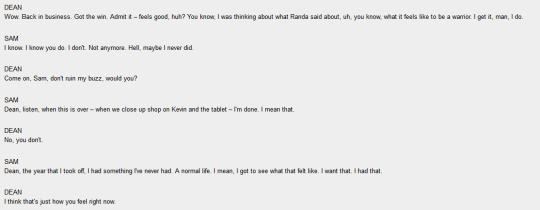

sam's own desire or attempt to leave the life seems to be fundamentally Wrong or is at least disproved of until dean approves of it/whenever it's part of dean's ideal for sam. 8.01, "so… free will, that's only for you?" the greatest sin is to disobey your patriarch; i think the culprit here re: sam's own person, just like it was with season four and the beginnings of soulless!sam, seems to be sam's rejection of the dynamics of his and dean's codependency in favour of his own attempt at independence. there's also the idea that dean would rather complete the trials that have a possibility of death than have sam go through the trials, die, then 'leave' dean to face the idea of living a life without sam—and he attempts to make this decision by on his own, without sam's input.
generally, i don't believe sam needs any excuse(s) to live a life outside of dean but the narrative's own facilitation of sam back into the non-role (the struggle to fit into the role) of his and dean's relationship, the dichotomy of monstrosity, the cycle of abuse, the patriarchal structure etc. etc. after his attempts at independence are endlessly interesting to me and although this isn't yelled at you through explicit exploration, i do consider aspects of sam's history with mental health to be relevant within several aspects of season eight, but mostly being related to sam's decision to leave hunting specifically within the context of the year between seasons seven and eight (especially after all that is seasons three to seven) as it's explored in 8.08. ultimately though, i think the major aspects of sam's decision to leave revolve around 1) grief and sam's avoidance of his grief, which is pretty well represented by his initial reluctance to name riot and explored through sam and amelia as mirroring characters (how blatant it is pisses me off a little),





and 2) the very basic building block regarding sam as a character that is his desire to leave the life. quite generally, i think the fact that through dean's own conflation of family and hunting (on account of john's own pov that through choosing college over hunting, sam had also chosen college over family) as well as dean's own pov prioritised through his and sam's relationship along with the previously mentioned structures, the idea that sam, too, is therefore unable to leave the life or subvert any of these structures without it being perceived as leaving dean or forsaking family is pretty neglected within a lot of interpretations of sam as a character. i think dean very much keeps sam tethered to the life either through sam's own ability to choose dean and their conflated lifestyle over something/someone else (later season one, season two, three, later nine to fifteen) (there's also the guilt tripping) or as a result of being preoccupied in a way that inhibits his idea of normalcy (his monstrosity in seasons four and five), but on account of the dynamics and his and dean's relationship, sam is unable to reject their codependency which perpetuates hunting and SamAndDean as existing synonymously. i mean, even when sam was hunting without dean as soulless!sam, on account of the agency and autonomy sam was able to achieve due to the differences between s!sam and sam's priorities due to the difference between then (the soul lol), s!sam's rejection of his and dean's relationship did become evidence for his monstrosity. which is, of course, punishable by (possible) death should dean decide that the dichotomy will not stretch to accommodate said monstrosity.
season eight, to me, is when these characters first start feeling a bit like cardboard, especially due to how wittled down to its core sam and dean's dynamic is represented. this is the most boring and basic version of How They Work at this point in the show and even then people explain their simple and cardboard-ish behaviours away with explanations like saying they're 'ooc'. sam's state of mind is pretty straight forward if you know where to look; sam taking his entire family's death as his sign that he's able to leave the life is not out of character to me at all. kill the supernatural appointed patriarch in your head.
#also i've said this before but the cast‚ specifically jared and jensen‚ are part of the fandom to me#and their interpretations of these characters mean just as much to me as any other fan#which is to say the interpretation exists for me to critique to develop my own#unless our interpretations do align or agree in some way shape or form#like to me‚ their involvement in the show and with developing the very same characters for whom my interpretations exist for#does warrant respect and a greater voice when it comes to what the story itself (and these actors) is (are) trying to tell#but ultimately it's just as subjective and able to exist synonymously as every other interpretation#most of what i've seen from jared around the time of seasons eight and nine are mostly involved with his defending sam from#and disagreeing with a lot of the interpretations that leak through into the questions people asked him at cons or during interviews#there is suchhh a palpable difference between how jared answers questions relating to sam's inner world#before season eight vs after season nine‚ especially during shared panels‚ that is very telling#quaerit#se referat
22 notes
·
View notes
Note
I'd love to hear about your thesis topic (if you're not already sick to death of talking about it 😂)!
Aa, thank you for reaching out, it's so nice of you to ask!!
I'm definitely not sick of talking about it yet! I suspect that it may be the other way around and people around me are starting to get sick of hearing about it 😅
The topic is broadly a mental health disorder which supposedly plagued early 18th century Britain interpreted through a philosophical lens.
More specifically, there was this physician and philosopher called Bernard de Mandeville, who was one of those people who had thoughts on absolutely every topic imaginable, spanning from economical and social theory to medicine (he was also a huge classics nerd but with people in the 1700s, that probably goes without saying).
Supposedly to gain more patients for his practice, he wrote this wonderfully weird medical treatise on how to deal with hypochondria (the name can be misleading, but back then it referred to an unspecified mental health issue close to our current understanding of depression). It is written in a form of a dialogue between a doctor and a patient, and it discusses various symptoms of the disease as well as practical advice on how to treat it (including some great wine recommendations and seemingly endless quotes from Horace and Ovid for some reason).
One thing that particularly fascinates me about the text is that it shows a kind of proto-therapeutic approach to the treatment of mental health issues and it places a lot of emphasis on the developing relationship between the doctor and the patient. The wife of the hypochondriac who suffers from the same illness as her husband is also present, so at times, I'm attempting to go for a slightly feminist angle (Mandeville was not exactly a feminist but some of his ideas about gender were genuinely progressive for a guy writing in the early 1700s).
I'm writing it under the philosophy department, so I sadly had to minimise the historical context in my actual writing. I did research it however! A lot has been said about how hypochondria characterised British people specifically and how an increasingly easy and comfortable life of the upper-middle class may have paradoxically contributed to it. It's also been linked to philosophers/men of letters since it seemed to have affected this group of people in particular (perhaps most famously David Hume who is my supervisor's number one guy).
The result I ended up with is a bit chaotic, but I genuinely had a ton of fun researching the topic! I got a chance to engage in one of my most favourite things in the world, which I guess could be called amateur psychoanalysis of people from the 18th century.
I've also argued by the end that it is useful to study early modern texts (and by extension all historical texts) since it helps us to see which aspects of the human experience remain unchanged over time. (Spoiler: although wine is no longer recommended as a cure, we don't differ that much from people living three centuries ago in all of the important ways. Most notably, we all need positive interactions with others for our mental well-being and to some extent, we all crave others' approval).
Actually getting it printed soon — then it's just anxiously awaiting feedback and then onto the defense.
Hope my answer is not too long or incoherent and thanks again for asking!
#thesis#thesis era#asks#✨#I can't write concisely I swear#writing an abstract was painful#philosophy#1700s
37 notes
·
View notes
Note
The previous anon articulated it so well bc I just saw what they're talking about and I'm honestly confused why they thought u were saying anything wrong like 😭😭 are we sure we have the same guy here? Aventurine while yes knows what being loved feels like, he's gone through enough things and changes in life that that little frame of reference won't serve him well, especially within a romantic context bc he doesn't have ANY reference.
I read what you wrote as him not really meaning to (even reread) and yeah, he wouldn't Purposely want to be abusive to his romantic partner, but it still borders on it. What a lot of ppl get wrong is that, emotional abuse doesn't have to always mean the perpetrator is fully aware of it themself.
Maybe bc I myself have bpd, but it's so easy to see. When someone's avoiding negative feelings they have about themself (jealousy, insecurity etc) they can easily externalize this blame (and for him, that's so much more likely, it's literally a defense mechanism) or even, projecting his own view of himself on how you view him only to end up upset. (And then, the random clinginess that comes after this pushing away, why would it happen if not for trying to convince you to stay even though what he keeps doing is generally not a good thing to do in a relationship?) He wouldn't have known healthy attachment, didn't grow up with a safety net to be comfortable with that, hell, he thinks people closest to him (in canon) are sort of "tolerating" him. Are we really surprised?
Like, you never said aventurine is doing it with intent or even awareness bc yea he isn't!! He'd realize some of his actions sure, but stuff like "pushing you away" is probably shit he genuinely considers good for you, and it's not even like completely wrong he's in a high and risky position. Doesn't mean it wouldn't hurt like a mf, and I think that's the biggest tragedy of it all, because he doesn't fully realize how bad his actions are from another pov, and it's not like a single Convo can get him to understand that.
Anyway, sorry that was a lot more incoherent than I thought and I was firmly stating a lot of things bc I can pull up stuff to back my claim but ALSO bc they pissed me off if u don't like something just scroll I've been doing that for years on this app I never felt the need to go yell at someone bc I don't agree with how they interpret a character 😒😒😒😒 I hope ur feeling better, rsd sucks ass I always get so overwhelmed whenever I experience it but ur intent came across very clearly actually dw
I’m literally in tears I’m so grateful multiple people are taking the time to reassure me thank you so much 🥹🥹🥹 I was really doubting myself and my own take on him, it makes me feel so relieved I’m not the only one who has this specific take on him haha I was lowkey worrying I was a terrible person for a moment there 😭
And yes, exactly !!!! I think you were very coherent in this, in fact I think you formulated what I meant to say better than I did 😭😭 Like there’s a lot, a LOT of nuance to it !!! He never does it out of malice. He just doesn’t know any better. He tries to do what’s right and what’s best for you, he’s just… kind of not good at that because his whole perspective is skewed.
I do still think they were right that I shouldn’t have used the word ‘abuse’. It’s a very loaded term, and I think abuse requires a power dynamic, which is something I think he would try to eliminate in a relationship. Like, yes, he is a powerful man and he sort of needs some leverage to stay in control (of both his own life and his relationship with you), but I think he fucking hates the idea of being “above you” in any way. (Though to be fair he still could unintentionally create an uneven power dynamic — he’s the one mostly in charge of when the two of you interact. I think he loathes himself even more when he realises that.) I think it would be best to stick to the word “toxic” because it feels most fitting from my pov
#[rawbin]#[aventurine]#[rawbin ramble]#sorry my mind is a little bit of a mess rn#stressed about a con I’ll be attending very soon (still haven’t even finished my wig bro)#stressed about taking the train there (second time in my life I’m going on a train without parents)#stressed about the fact that I’m sick and I’m very scared I’ll be coughing at the convention (I have spent way too much money to not go 😭😭)#I’m so incredibly thankful you wrote this to me#it makes me feel so much more secure in myself and happy#I really really really appreciate it
8 notes
·
View notes
Note
leans casually on the wall. hi. if possibly could i know about the theories you have rn for the rtl groups trap reactions….👁️👁️
I can give you like.... 75% of one??? I guess???
I've been staring at kenta's character page for the past 40+ minutes trying to figure out what his deal is and I thinkkkkkkk I might be on to something? I've got nothing for anyone else this little shit is my area of expertise
mostly I've been staring at these bad boys

the meanings of the first and last ones is pretty easy to figure out, "a dangerous mind" is probably referring to his programming skills/being a little bitch and "what kind of a joke is trust" obviously means his cynical attitude towards interpersonal relationships
such as this line from the opening show look at me point proof explanationing

"hands that pulled away" is interesting though
I'll include that the google-translated version of the official website lists these for the tags in english
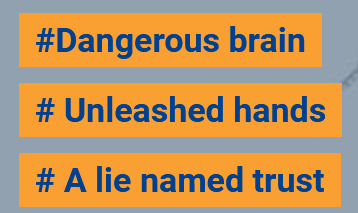
and while the dog pun in "unleashed hands" does not escape me, I feel like "hands that pulled away" is probably more accurate (and is more interesting)
to me, the easiest way to interpret these tags together is as a chain of causality, with "a dangerous brain" causing "hands that pulled away" causing "what kind of a joke is trust"
translating that out of nonsense talk, I'm imagining that kenta's trust and interpersonal issues were caused by someone, either a caregiver or circle of peers, "pulling away" from him in response to his "dangerous brain"
we can actually verify this, or a similar event, through the timeline:

specifically, this entry:

it's clear that this event was what led him to take up programming, and that his opinions on other people were mostly solidified by age 8 (although the exact nature of the virus he created is vague, it's easy to assume it wasn't one you'd make while worrying about other people. we've all recently seen what massive international tech issues can do)
this is the most concrete theory I can think of based on the information available but while I have your captive attention I'd like to pose a similar question-
-when the HELL did he get his phantometal?
this was where my train of thought went after staring at that webpage for so long
certainly, there's no way he received it before entering the prison system. it does make sense that phantometal would be circling within prisons, especially considering how... weird the one we see is.
again this is where MORE DETAILS would be appreciated, GCREST/AVEX
mostly, I propose a chicken-and-egg problem: do you obtain phantometal from succeeding in prison rap, or do you succeed in prison rap because you have phantometal?
also, the exact timeline of prison rap rankings is. nonexistent. HOWEVER, we can again use the timeline to make inferences. it's mentioned that he begins posting tracks online at age 13. given how the prison operates (and the tidbits I know about real life) it's highly unlikely he would have access to a computer for long enough periods to produce and upload music without the preferential treatment given to those at the top of prison rap. therefore, I posit that this prison rap success occurred around age 13.
we also know that possessing phantometal was a qualifying requirement for participation in rtl, so this narrows down our timeline ever so slightly
in my mind, the most likely circumstances for kenta to acquire his phantometal are the chicken-and-egg solutions from above, which places the final date near the one we established for prison rap, around age 13
I have a few ideas as to how he got it, but I'm gonna keep those under wraps for future evil purposes
but that's just a theory
a-
no I'm not doing it it's too easy
and cut
#paradox live#paralive#kenta mikoshiba#GCREST PLEASE MONKEY'S PAW IMMEDIATELY PROVE ME WRONG#DROP THE TRAP REACTION DETAILS#sorry half of this is entirely unrelated I just think WE NEED MORE PHANTOMETAL LORE#PLEASE. what is the ECONOMY how is it REGULATED#this post is sponsored by worldanvil because clearly gcrest needs it
17 notes
·
View notes
Note
I love your blog and recently watched your amazing YouTube essay! In a nutshell it blew my mind. Having the historical context of 2th century Polish history leading up the the publication of this work, in addition to your detailed analysis of Orwellian and Huxlian societies has helped me gain a whole new level of understanding and appreciation for The Witcher.
I read the books years ago and am beginning a re-read. Being someone who didn't receive the most thorough education on reading media critically or analytically as a younger person, and now trying to redress this fact about myself as I read works like this going forward as I approach middle age (I'm a bit of a "late bloomer" in several aspects of my life including building this skill set), I unfortunately missed a lot of allegory and subtext in my first reading. I enjoyed it mostly fannishly and getting into the characters at that time in my life. Your analysis has been really helpful on this journey of getting back into the books.
My question for you is that I've seen a few random references online to people theorizing that the Dopplers are an allegory for the LGBTQIA+ community. However, I've not been able to find any detailed analysis of this possible allegory and only finding people mentioning it in passing on forums and such.
As a reader who is also part of the LGBTQIA+ community, I would love if Sapkowski had intentionally injected allegory and commentary on queerness and the othering of our community in his work, but I'm reluctant to get excited about something that might not actually be there.
Of course I know a lot of these things are up to the interpretation of individual readers. But I'm also extremely curious to know what you think. Are you of the opinion that there is any queer subtext or allegory in the Witcher saga?
Thank you for your time if you get a chance to answer my ask! And thank you as well for your beautiful work on this series so far, I'm really looking forward to more!
thanks! and honestly, though i'm younger i also have a mixed relationship with reading and media literacy. so you're certainly not alone, also related to witcher/all things fantasy and pop culture, i think it's normal to engage with it for only the characters and story, especially on the first read.
as for LGBT subtext in the witcher...
the first thing to acknowledge is that LGBT subtext is preceded by actual LGBT text in the witcher. we already have some lesbian, gay, bisexual characters and relationships, and at least one trans or gender non-conforming, androgynous character.
the second thing to acknowledge is that this text isn't particularly meant to empower or represent, either in a positive or negative light. it's less about actually being LGBT, and more about how LGBT identities have been represented in the genre.
usually, it goes along with the regular practice of the witcher, its "guiding principle" as i might call it, being to subvert reader expectations, parody, or satirize elements and popular tropes of the fantasy genre. so, for example, mistle rapes ciri not because sapkowski wanted to depict lesbianism as predatory -- he wrote it because he was familiar with the trope of female heroines in fantasy being ahem, "claimed" by male warriors, and wanted to subvert this trope by having a woman do it instead.
so, we get a lesbian relationship, that, like the M/F relationships he was referencing, begins with a rape and turns into a romance by the end of it. this isn't to say that this is a logical sequence of events, but just that it was inspired by other texts -- it was never intended as commentary on lesbianism itself, but instead, of some fantasy texts that sapkowski had criticism of.
speaking of the author's perspective... i'm certain that if he was asked about any of this he would say he doesn't have any opinion, but this is just what i'm collecting from reading him... i'll go from best to worst.
(ŚKA = Świat króla artura, HiF = Historia i fantastyka, RZwSJ = Rekopis znaleziony w Smoczej Jaskini)
the good: his opinions on same-sex female relationships are... neutral to somewhat... positive? he seems to correlate lesbianism with feminism (aka political lesbianism). though he's denied identifying with feminists and feminism, saying that he does not intend to appeal to feminists or read feminist publications, in ŚKA and HiF he starts explaining unprompted ideas about the prehistory of matriarchy, associations of magna mater, and the relationship of wicca... and in RZwSJ includes an entire paragraph with recommendations of fantasy featuring lesbian relationships.
so i think any opinions he has about lesbianism are entirely conflated with his ideas of female power and worship, and/or as previously mentioned, challenging fantasy tropes - both are huge themes across all of his writing. which... i guess is a good thing?
however, i think that this interpretation of lesbianism through the lens of politics can be problematic because he fails to understand that a lot of lesbians like other women for kind of the same reasons straight men like them: because they are fucking hot. (but i guess he did acknowledge this a little with philippa and her countess, so whatever)
i'll also allow myself a small tangent about neratin ceka here, because i feel like his representation was not bad at all, and yet he's entirely missed whenever these discussions about sapkowski's views on LGBT happen, probably because no one read as far as past chapter 2 of tower of the swallow.
we even get the joke cliche of "i'm a bad guy, but i'm not a bad guy" with stefan skellen, who fantasizes about banditry and rape, and wants to kill ciri out of reasons of state, but, when he's told that ceka's gender doesn't really matter unless he wants to marry him, its his being a good soldier which counts, skellen's like, "yeah, ok, that makes sense to me, you're right." so the story doesn't make a joke about him at all, only for a moment raising the "what's his gender??" question in the mouth of a villain -- other than that, neratin ceka is treated by the story just the same as all the others of skellen's hanza (well, except for the fact that he was an imperial spy... but see, he was given an interesting role in the story).
anyways, here's the bad: LGBT characters being the butt of a joke, and not even "characters" but the concept of, for example, the only representation of fat GNC women being antagonistic, stupid, and gross (season of storms, the guardswomen of kerack), or homosexual quid quo pro committed by the guy who is so fucked up evil he will do anything to get political influence, including gay sex (season of storms, sorel degerlund) or attempted homosexual rape (narrenturm, the werewolf), or... homosexual sex slavery (lux perpetua, szarlej trying to "buy" reynevan).
it's... cringeworthy. though i will say the last one i mentioned here read like a monty python sketch rather than punching down, it is more making fun of the discomfort of the slavers themselves at the idea of homosexual desire and sex (which is ironic, because... they are slavers).
with an overview here, i feel like in terms of same-sex male relationships, more often than consensual relationships are jokes about rape, situations like pederasty, actual rape but this time treated as a serious threat (it was either in warriors of god or lux perpetua, one of the times in which reynevan was kidnapped). ... i don't know if i can name one positive, romantic gay relationship from any of his writing (whereas i might be able to name a couple of lesbian ones)
at the same time, he's never said that being gay is wrong, immoral, or espoused fears of gay people taking over, which... is notable as we look amongst his contemporaries in the polish SF/fantasy space of the 80s-90s. (that, and that he's so staunchly pro-choice). but that also doesn't make him some champion of LGBT rights, lmao.
when it comes to the subject, i think he is mostly just a contrarian who seeks to challenge conservative sensibilities and what is considered socially acceptable... so this sometimes results in accidental representation, and sometimes it results in offensive situations or "jokes". i don't believe he has an agenda either way for LGBT rights or condemnation, he generally is against oppression of any sort, but he doesn't put himself on the frontlines of advocacy. and at the same time carries his own biases of LGBT topics, some of which i don't agree with. (ik you didn't ask for this whole review, anon, but i wanted to include it to clarify the topic).
so, finally, about eternal flame.
i wrote this out years ago (with more of a gerlion spin to it, and i kind of roll my eyes at it now) but the basis of the dopplers as an lgbt allegory analysis is that:
dopplers are entirely innocent beings which are persecuted for no reason other than they're different, so they change shape amongst society to remain undetected --
and they've done this successfully, so much so that at the end of the story we realize that more people than one might have assumed, including chappelle, the head of the church of the eternal flame (coughs, catholic church, coughs) who was persecuting the protagonists for relation to a scandal involving a doppler, is in fact a doppler himself who took the persona after the real chappelle died two weeks ago.
so... i think that if one chooses to see it, they can -- though i probably wouldn't argue that this is a certain meaning, it's only one possible interpretation.
and again, it's not like positive representation, hah, i think one can draw their own conclusions from that short summary (especially the part about high-ranking priests being gay... hmmm...), but the fact that the dopplers are innocent and being persecuted and tortured for no reason, and we hear tellico's side of this at the end of the story putting them in a sympathetic light, and the entire moral of the story being acceptance of the other (with tellico even being adopted as dainty's cousin, lmao) i find it palatable because of that.
sapkowski has also denied that he includes any allegories in his writing, but because this doesn't make sense when looking at the first/second nilfgaardian war, i think to interpret this more as there is no specific representations of people or historical figures in his writing (the quote went something like "please do not look for the alter-egos of stalin or bierut amongst my characters...") rather than allegories to real life events or social realities, because those he certainly does include.
14 notes
·
View notes
Text
(In advance I apologize for any grammatical or syntax error that I may have, English is not my first language).
The Separated AU by @cupcakeslushie has been my complete adoration and obsession in recent days, so (with the author's permission) I created this playlist for Separated!Donnie!
I have chosen the songs mostly for their lyrics, so the musical genres may be all over the place, hehe.
The title comes from the mini comic "Thirds", also part of the Separated AU and creation of Cupcakeslushie, because damn, that interaction between Donnie and Splinter hit me hard.
That there are thirty-three songs (Three Three) in the playlist is... totally a coincidence! But it is one of which I feel very proud!
You can listen it on YouTube here or on Spotify here (I recommend the YouTube version more, since on Spotify I couldn't find all the songs or not in the versions I wanted).
Below is a brief explanation of why I chose some of the songs, (you can ignore this if you like) But enjoy the music and go see the Separated AU, I recommend it with all my heart!
(This part is very based on my interpretation of Sep!Donnie, so I may be wrong about some things.)
— "Saint Bernard" and "Cradles" are the first songs for being the ones I most associated with Donnie. The first for talking about being a failure and that there is something intrinsically "wrong" with you. The second I associated with his way of seeing the world and the fact that he does not perceive what has been done to him as abuse.
— The instrumental melodies I chose I feel they are a good reflection of his mental state, especially in one of his episodes.
— "Papercut" was a song I heard and it was immediately like: "Oh, yes, this is Donnie talking about Three and the hallucinations he has of his brothers".
— "Immer Sie" is one of the few songs I chose with a specific moment in mind, in this case: Donnie attacking his family because he felt they were leaving him behind and abandoning him. The song speaks of a desperate and almost aggressive love, in addition to having in its lyrics a fairly broken syntax. That is why I think it can reflect Donnie's altered mental and emotional state in that specific moment.
— There is a song that clashes a lot with the others and is "Lovefool (Remix)". However I think it represents the affectionate behaviors, although sometimes too intense, of Donnie, as well as his need to be loved.
— I think "Pale Machine" is a song that would play once Donnie was rescued by his family and once he was living with them. Although he is very happy and basically the situation is a dream come true, that does not mean that all his problems are fixed.
— Two other songs for specific moments are "What I've Done" and "Cop Graveyard". I am referring to the moment Mikey finds out about the collars his brother made for Big Mama, and when Donnie realizes that he basically helped Shredder poison Leo's mind.
— "Rolling Girl" is the first of the comfort songs, being a reflection of the way Donnie sees himself and how his family is doing everything possible to help him out of that vicious circle.
— I see "Demons" as a song dedicated to the relationship between Donnie and Vee (which I love). In turn, "Devil Town" would be Donnie's relationship with Leo, Raph and Mikey.
— "New Soul" is basically Donnie on the road to recovery, with its ups and downs.
— Finally, "Somewhere I Belong" is not exactly a happy or entirely positive song, but whose central theme is something that Donnie has been working on and has wished all his life: a place to belong to.
And with this ends my TED Talk, thanks for coming.
#cupcakeslushie#cupcakeslushie separated au#sep!donnie#separated donnie#Playlist#this au is AMAZING#please all go to see it#I had so much fun doing this playlist#rottmnt#rise of the tmnt#rottmnt donnie#rottmnt donatello#rottmnt separated au#separated au#Spotify
128 notes
·
View notes
Note
Okay I've been waiting a few patches to talk about this so people had time to finish the end of 6.0 but I have to talk about Zenos and his final moments because the way he called the warrior of light his mirror really hit me.
His mirror, his reflection, who he could have been and had. To seek out a life of adventure and strife. He's right, the wol and him are two sides of a coin who WERE born to seek adventure and strife but I also think that in calling them his mirror he sees what his life could have been had he not been born into an empire, what his life could have been had he been luckier, been granted freedom that his position and life as a prince and possible heir to a blood-soaked throne would have never afforded him.
Also the way he stops calling the wol his beast and begins referring to them as his friend. He originally took an interest because they were strong, because he could face him and for the first time in a long time he found a challenge and excitement. But I think what originally started as a fascination changed into a longing that he didn't understand. I think in the time between calling them his beast and his friends, he heard and saw the love and trust between the wol and the scions, saw how they'd go to the end of the world and back for them and he eventually realized that he longed for someone like that (it's obviously been stated the relationship with the NPC's is up to player interpretation so take the however you like).
I think why he went to such lengths in end walker to get the world’s attention is that's what he equates being worthy to. Worthy of their time, worthy of the friendship. Because in his mind if you don't want someone to be your friend there's no reason to pay attention to them, they aren't worthy of it. That's why he does and goes to such extreme lengths. In one of the final cut scenes, he says “you value life, you do not burn yours for reasons you do not deem worthy” and that's what he wants to be.
I also think the reason he’s always looking for another battle with the wol is because that's all he knows, he wasn't given love or taught normal life skills and if fighting them is what gets their attention then that's what it has to mean to be friends right? Fighting is the only thing he knows, even saying it's the sole pleasure he has to offer. He so badly wants the wol’s attention and friendship but that's all he believes he has to offer and that's why fighting them is the only time he feels any joy or contentment. To him it means he's worthy, that they CARE, and that's something he probably never felt before.
Yes, this. I agree so much. It's so hard for me to rewatch the final scenes with Zenos because I just wanted more for him. I have many grievances with EW, but the largest part is that everything felt so rushed, so tightly packed in when we could have spent TWO expacs exploring it all.
I wanted more Zenos, honestly. I wanted more of a few characters, but I am a bit biased since Zenos is neck to neck with Haurchefant for my favorite character, I could not possibly choose between them.
It is because of this "what if", "what could have been" that I don't think I will tire anytime soon of writing Zenos & exploring his character. Of following at those threads & extending them beyond what MSQ gave us.
I am not tired of Zenos, I want more of him. If he shows up again, I will cheer.
#ffxiv spoilers#endwalker#ffxiv endwalker#ffxiv endwalker spoilers#ew spoilers#Ram replies#zenos yae galvus#zenos viator galvus
74 notes
·
View notes
Text
So I decided to listen to the two songs from the movie Bolt and I've decided they're both Rancher coded. The songs in question are I Thought I Lost You and Barking at the Moon. The first one could also be argued for Clock Duo because I love making everything them coded BUT THAT'S NOT THE POINT OF THIS POST anyways for the first song:
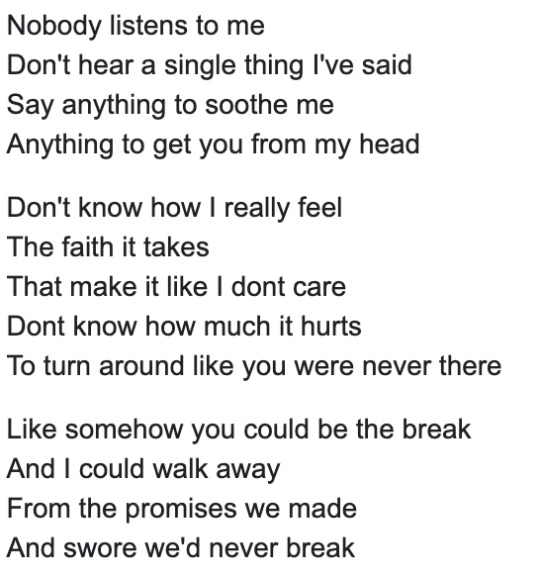
So this starts from Jimmy's perspective. Anyone who knows me and my Rancher writing (which how could you I've yet to post any) knows I love making Jimmy this pathetic man (I love my pathetic men <3) who - because of all the toy comments in Empires S2 - is constantly teased and lowkey bullied but not full on completely but he's kinda sensitve about it. Anyways that's what brings up the first two lines. Beyond that, this would be set after Double Life and poor Jimmy just can't stop thinking about his rancher! He's not completely sure on his feelings because typically relationships that form - whether it be positive or negative - stay within the traffic smp series and never follow the characters back home. But he's home and he's still got Tango on the brain. ALSO if you listen to the song, on the line "anything to get you from my head" there's this guitar riff and that's symbolizes Tango because when it comes to music, Jimmy is country and Tango is rock. Does that make sense? Does any of this make sense?
And so we continue! So with the soulmate bond gone, it's hard for JImmy to go day to day as if he doesn't miss that strong bond the two of them had. The line "Like somehow you could be the break" refers to how a part of JImmy hoped Tango would help him break his curse. The "promises" were most likely Tango one, vowing to help him stay alive and two, after they died, promising to somehow find him again before the next traffic smp season so they could be happy together in peace.
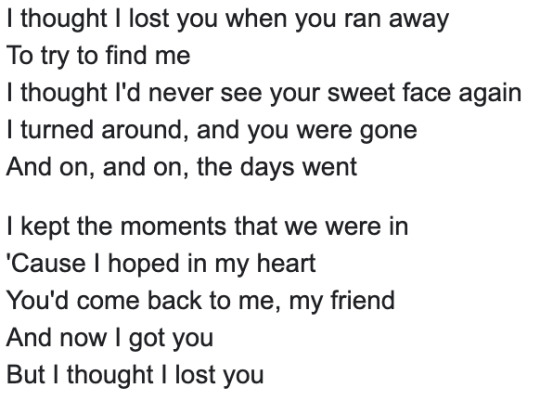
This is the chorus! It's very much as seen; all Jimmy has of Tango are the memories they made on the ranch, and he thought that Tango wouldn't be able to find him again but he still held onto that hope. But as the lyrics say "and now I got you, but I thought I lost you" surprise! Tango IS there now! I'd say this would be the Empires crossover, like when they met in the tunnel aka the moment that has never left my mind ever and I always think of. Also in the chorus is when John Travolta joins Miley Cirus in singing, so that further adds to the reuinion!
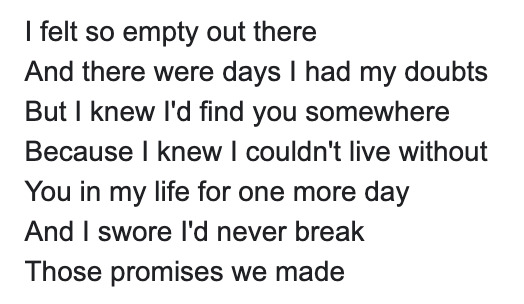
So this is Tango's verse, and like with the chorus, it's pretty "as seen" with my interpretation. Tango is determined to find a way back to Jimmy despite not knowing how at all, maybe he'd see the open rift as an oppurtunity to. And he's referring to that second promise but also the first one as he's still anticipating when the next traffic season will happen aka lim life.
Then we jump back into the chorus, which stays the same.

This is both of them, with Tango being the first two lines, Jimmy the second two, and both of them as the last two. This is them after the big reunion hug that shook the world. Tango's eagerly explaining how he never gave up, Jimmy's assuring him he never lost hope.
And then the rest of the song is essentially them being all gay and excited because they're together again yippee!!
That concludes my explantion of the first song so naturally, because this post isn't NEARLY long enough, we're doing the second one too!
Also with this second song, I'm kind of ignoring the allusions of cats and dogs just fyi

This is so so Tango. He's a hard worker, married to the grind. The sun? Who's that? The guy who gives all his attention to his Decked Out 2 project (much like in S7 with the first one and the among us minigame) doesn't take much time to appreciate the simplistics of life. But having the ranch with Jimmy kind of forced him to sit back and take in the world around him and kind of slow down. It's like he's truly been reborn into a new life when he's with Jimmy and that doesn't mean his life before him was bad, but his rancher makes him feel more, understand more.

Very much on point; the only place Jimmy and Tango truly feel at home is when they're with each other and on the ranch. They dream of running away together and living out the rest of their lives on a big ranch with enough plants and animals to keep themselves self-sustained. And with Tango's redstone prowess, they totally could.

THIS IS JUST JIMMY THIS IS SO JIMMY YOU CANNOT CONVINCE ME OTHERWISE because this verse refers to his canary curse, how each season built up this hopelessness and depression. "I have been a lot of things, they may not all be true" is him saying that he's not defined by the canary imagery, by the canary curse that follows him. He's also not defined by the toy titles the other Empires members would throw at him. "My experience was so mysterious, till I met you" once again referring to the canary curse and Double Life with Tango. Being with him, not just as soulmates but with him as a romantic partner, suddenly everything in his life made sense. Tango was that missing puzzle piece that somehow ended up under the couch even though the puzzle was opened on the dining room table. And now that he's found him, his life is whole.
Anyways the rest of the song is just repeating the chorus, which just doubles (haha) down on the points I made earlier with the chorus. But at the end of the song, when Jenny Lewis sings "there is no home like the one you got, cause that home belongs to you" one final time, the song is like, slowing down. That's Tango and Jimmy finally settling down together on their dream ranch, feeling content with the life they're going to spend together.
And that concludes the longest tumblr post I've ever made to date. Am I mentally well? Should I look into being diagnosed with literally anything? Are there probably songs that fit them so much better? These sure are questions!
What mainly inspired this was sincerely-nines asking for songs that made people think of Ranchers, and then I saw a tiktok reminding me of one of the Bolt songs, and the pieces connected and here we are! If you read the whole thing, I award you a farm animal sticker of your choice.
25 notes
·
View notes